Historical context
Vision 2030 and the National Development Plan
Legislative framework
Progress and plans
Parliamentary process
25 years of democracy
Transforming the rural economy
Transforming the urban economy
Community Survey (2016) – agricultural household
Land audit
Recapitalisation and development programme
Women and land
Examples of successful land reform projects
Resources
Join the conversation
Historical context
The dispossession of land through the 1913 Natives Land Act was apartheid’s original sin. The “land question” goes back more than a century to the 1913 Natives Land Act, which provided legislative form to a process of dispossession that had been under way since colonial times.
The 1913 Natives Land Act saw thousands of black families forcibly removed from their land by the apartheid government. The Act became law on 19 June 1913 limiting African land ownership to 7 percent and later 13 percent through the 1936 Native Trust and Land Act of South Africa. The Act restricted black people from buying or occupying land. The apartheid government began the mass relocation of black people to poor homelands and to poorly planned and serviced townships. No longer able to provide for themselves and their families, people were forced to look for work far away from their homes. This marked the beginning of socio-economic challenges the country is facing today such as landlessness, poverty and inequality. The Land Act was finally repealed when the Abolition of Racially Based Land Measures Act, 1991 (Act No. 108 of 1991) came into force on 30 June 1991.
Vision 2030 and the National Development Plan
The National Development Plan (NDP) states that land reform will unlock the potential for a dynamic, growing and employment-creating agricultural sector. The NDP bases land reform on the following principles:
- Enable more rapid transfer of agricultural land to black beneficiaries without distorting land markets or business confidence in the agri-business sector.
- Ensure sustainable production on transferred land by making sure that human capabilities precede land transfer through incubators, learnerships, mentoring, apprenticeships and accelerated training in agricultural sciences.
- Establish monitoring institutions to protect land markets from opportunism, corruption and speculation.
- Bring land-transfer targets in line with fiscal and economic realities to ensure that land is successfully transferred.
- Offer white commercial farmers and organised industry bodies the opportunity to significantly contribute to the success of black farmers through mentorships, chain integration, preferential procurement and meaningful skills development.
Nelson Mandela said in 1995: “With freedom and democracy, came restoration of the right to land. And with it the opportunity to address the effects of centuries of dispossession and denial. At last we can as a people, look our ancestors in the face and say: Your sacrifices were not in vain.”
Legislative framework
The Constitution of the Republic of South Africa provides a framework for land reform protection of property rights and expropriation if it is in the public interest.
To address the consequences of the legacy of apartheid with respect to land, the South African Constitution included the following three clauses:
- A person or community dispossessed of property after 19 June 1913 as a result of past racially discriminatory laws or practices is entitled, to the extent provided by an Act of Parliament, either to restitution of that property, or to equitable redress.
- The state must take reasonable legislative and other measures, within its available resources, to foster conditions which enable citizens to gain access to land on an equitable basis.
- A person or community whose tenure of land is legally insecure as a result of past racially discriminatory laws or practices is entitled, to the extent provided by an Act of Parliament, either to tenure which is legally secure, or to comparable redress.
The Expropriation Act (Act 63 of 1975) provides for the expropriation of land and other property for public and certain other purposes as defined.
The three key elements of South Africa’s comprehensive land reform programme contained in the White Paper on Land Reform include: Restitution, redistribution and tenure reform which address the constitutional imperatives.
Constitution of the Republic of South Africa
Applicable legislation
Government has enacted several pieces of supporting legislation as part of a comprehensive land reform programme to redress inequity in land ownership and transform the spatial landscape.
Deeds Registries Act, Act No. 47 of 1937
The Act makes provision for the administration of the land registration system and the registration of rights in land. It requires that deeds and documents be prepared and lodged in a Deeds Registry by a Conveyancer or Notary Public. These deeds and documents are subjected to three levels of examination by legally qualified personnel who scrutinise the contents for accuracy and compliance with common law, case law and statutory law.
State Land Disposal Act, Act No. 48 of 1961
The Act makes provision for the disposal of certain State land and to prohibit the acquisition of State land by prescription.
Sectional Titles Act, Act No. 95 of 1986
The Act makes provision for the division of buildings into sections and common property and for the acquisition of separate ownership in sections coupled with joint ownership in common property. It further regulates the transfer of ownership of sections and the registration of sectional mortgage bonds over, and real rights in, such sections. It also makes provision for the establishment of bodies corporate to control common property.
Land Administration Act, Act No. 2 of 1995
The Act provides for the delegation of powers and the assignment of the administration of laws regarding land matters to the provinces.
Land Titles Adjustment Act, Act No. 111 of 1993
The Act regulates the allocation or devolution of certain land in respect of which one or more persons claim ownership, but do not have registered title deeds in respect thereof.
Spatial Planning and Land Use Management Act, Act No. 16 of 2013
The Act provides for a framework for spatial planning and land use management in the Republic.
Expropriation Act, Act 63 of 1975
The Act provides for the expropriation of land and other property for public and certain other purposes as defined.
Transformation of Certain Rural Areas Act, Act No. 94 of 1998
The Act provides for the transfer of certain land to municipalities and certain other legal entities and for the removal of restrictions on the alienation of land.
Property Valuation Act, Act No. 17 of 2014
The Act provides for the establishment of the Office of the Valuer-General; for the regulation of the valuation of property that has been identified for land reform as well as property that has been identified for acquisition or disposal by a department.
Upgrading of Land Tenure Rights Act, Act No. 112 of 1991
The Act makes provision for the upgrading and conversion into ownership of certain rights graded in respect of land, as well as for the transfer of tribal land in full ownership to a community.
Land Reform: Provision of Land and Assistance Act, Act No. 126 of 1993
This Act makes provision for the designation of certain land, the regulation of the subdivision of such land and the settlement of persons thereon. In addition, it provides for the acquisition, maintenance, planning development, improvement and disposal of property and the provision of financial assistance for land reform purposes.
Restitution of Land Rights Act, Act No. 22 of 1994
In 1994, the first law to be passed by the first democratically elected parliament was the Restitution of Land Rights Act (Act 22 of 1994). This was done with the conscious acknowledgement that land justice is important to deal with the challenges of poverty, unemployment and inequality.
The Act makes provision for the restitution of rights in land to persons or communities dispossessed of such rights after 19 June 1913 as a result of past racially discriminatory laws or practices. To administer this task, the Act established a Commission on Restitution of Land Rights and a Land Claims Court. The Minister is authorised to purchase, acquire in any other manner or expropriate land or rights in land for the purpose of restitution awards.
Land Reform (Labour Tenants) Act, Act No. 3 of 1996
The Act makes provision for the security of tenure of labour tenants and those persons occupying or using land as a result of their association with labour tenants. It also makes provision for the acquisition of land and rights in land by labour tenants.
Communal Property Associations Act, Act No. 28 of 1996
The Act makes provision for communities to form juristic persons, to be known as communal property associations, in order to acquire, hold and manage property on a basis agreed to by members of a community. This has to be done in terms of a written constitution.
Land Survey Act, Act No. 8 of 1997
The Act makes provision for the regulation of the survey of land in South Africa.
Extension of Security of Tenure Act, Act No. 62 of 1997
The Act makes provision for the facilitation of long-term security of land tenure, to regulate the conditions of residence on certain land and to regulate the conditions on and circumstances under which the right of persons to reside on land may be terminated.
Distribution and Transfer of Certain State Land Act, Act No. 119 of 1993
The Act makes provision for the distribution and transfer of certain land belonging to the State and designated by the Minister as land to be dealt with in accordance with the provisions of the Act.
Interim Protection of Informal Land Rights Act, Act No. 31 of 1996
The Act makes provision for temporary protection of certain rights to and interests in land which are not otherwise adequately protected by law.
Electronic Deeds Registration Systems Act 19 of 2019
The Act provides for electronic deeds registration.
KwaZulu-Natal Ingonyama Trust Act, Act No. 3 of 1994
The Act makes provision for establishment of the Ingonyama Trust and for certain land to be held in trust.
The Bill aims to provide for the expropriation of property for a public purpose or in the public interest and to provide for matters connected therewith.
Land reform: progress and plans
Government has settled 80 664 claims benefitting 2,1 million beneficiaries at the cost of R40 billion inclusive of financial compensation to beneficiaries. 163 463 of these are female-headed households. Furthermore, Government has restored 3,5 million hectares of land which can be used as a catalyst for agricultural and economic development.
The Department of Rural Development and Land Reform is strengthening integrated development to ensure that land access yields broader economic spin-offs. The department is also resolving systemic challenges which form barriers to the progress of beneficiaries. To support black farmers, preferential allocation of water rights, infrastructure provision and access to markets will be applied. In the 2018/19 financial year, Government intends to settle 1 151 land claims at a cost of R2 billion; and prioritize post settlement support on restituted farms, to the value of R700 million.
Parliamentary process – motion to amend the Constitution
On Tuesday 27 February 2018, the National Assembly adopted a motion to amend the Constitution so as to allow for the expropriation of land without compensation. The matter was subsequently referred to the Joint Constitutional Review Committee.
The Committee undertook an extensive nation-wide public hearing process from June to August 2018. Deliberations on the public hearings and written inputs are set to occur between 4 and 7 September 2018, with the adoption of the report expected on 11 September 2018, where the Committee will make a recommendation to both Houses of Parliament for approval. If Parliament agrees to amend section 25, government must then draft and introduce a Bill (Constitution Eighteenth Amendment) that will give effect to this motion and specify the wording of the amendment. In order for the Bill to pass, the National Assembly, with a supporting vote of at least two thirds of its members; and the National Council of Provinces, with a supporting vote of at least six provinces, must approve it.
The process has provoked many strong reactions, both in support and against the amendment. Certain groups and parties have also tried to use the process to fear monger.
Government position on the parliamentary process
Land reform in South Africa is a moral, social and economic imperative.
Government will continue to accelerate the pace of land reform within the framework of the Constitution of the Republic of South Africa, respective legislation and according to the rule of law. Government will at all times act in the best interest of our nation.
Government’s intention is to unlock the economic potential of land. Government supports a land restitution and redistribution process which supports agricultural production and investment in the land.
By bringing more land into productive use, by giving more South Africans assets and opportunities for sustainable livelihoods, the country is creating conditions for greater, more inclusive and more meaningful growth.
Government provides support to beneficiaries of land redistribution through financing, training, market access, irrigation and the provision of seeds, fertiliser and equipment, all of which contribute to the sustainability of emerging agricultural enterprises.
South Africans are urged to be patient and trust the parliamentary processes to address land dispossession, rural development and food security. The proposed Constitutional amendment seeks to clarify and reinforce the fundamental principles of the property clause, which, among other things, prohibits the arbitrary deprivation of property and holds that expropriation is possible in the public interest subject to just and equitable compensation.
Addressing the Land Reform matter will not erode property rights, but will instead ensure that the rights of all South Africans, and not just those who currently own land, are strengthened.
Together we can ensure that we create a land reform model that works for everyone.
25 years of democracy
- It is nearly 25 years since SA became a democracy, yet the promise of that historic achievement has not yet been fully realised by the millions of people who are unemployed and live in poverty.
- The dispossession of land continues to determine the prospects of millions of South Africans, and it holds back the country’s economic development.
- The greatest obstacles to growth is the severe inequality between black and white South Africans. For the South African economy to reach its full potential, it is therefore necessary to significantly narrow gaps in income, skills, assets and opportunities.
- South Africa’s historical, highly skewed distribution of land and productive assets is a source of inequality and social fragility (World Bank)
- After skills, current distribution of land is the second-biggest constraint to poverty reduction and shared prosperity.
- For decades, the country’s assets — its land, its minerals, its human resources, its enterprises — have been owned, controlled and managed in a way that has prevented the extraction of their full value.
Transforming the rural economy
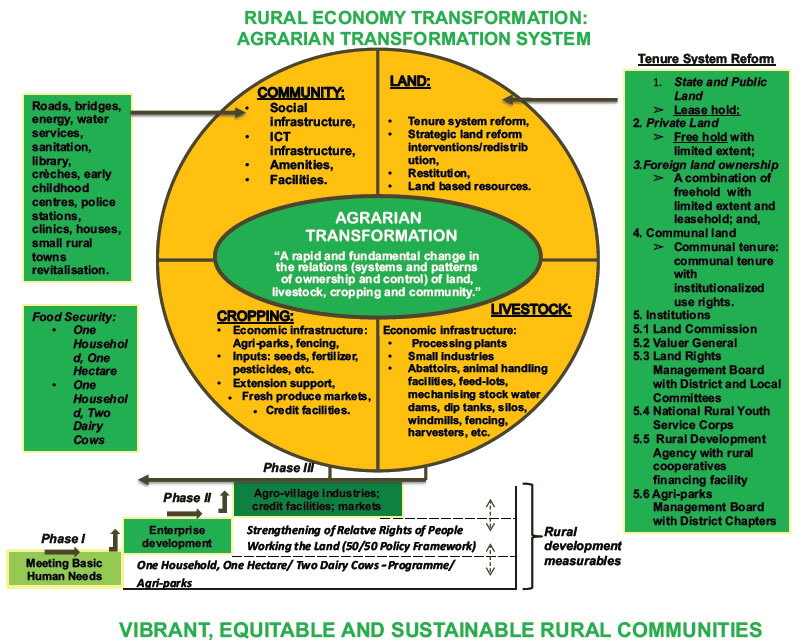
Transforming the urban economy

Glossary
Land redistribution
An effort by governments to modify the distribution of land ownership. It is often an attempt to transform an agrarian structure composed mainly of large-scale farms into one where family farms are predominant by taking land away from large landowners, or the state, and redistributing it to tenants and landless peasants. Historically, land redistribution has been carried out to abolish feudal, colonial, or collective forms of landownership and more generally to correct old wrongs.
Land tenure reform
A programme designed to change the legal and institutional framework for land administration. Other common changes attempted by land tenure reform programs include modification of the land tenure system and decentralization of the land administration and management function. In any society, the need for land reform reemerges regularly because the legislative and institutional frameworks for land administration have to be modified continually to adapt to changing political, economic, and social circumstances.
Land reform
A broader term comprising both land redistribution and land tenure reform. Land reform often takes place within an even broader strategy of agrarian reform: a collection of activities and changes designed to alter the agrarian structure of a country. Factors that influence the characteristics and evolution of this structure include bioclimatic conditions; socioeconomic, cultural, and political systems; population density; and technology. The objectives of an agrarian reform generally are to improve the levels of agricultural production both qualitatively and quantitatively and to improve the agricultural producers’ standards of living.
Community Survey (2016) – agricultural households
- The number of households engaged in agriculture (also referred to as agricultural households in this report) was 2,33 million in 2016 compared with 2,88 million in 2011. This represents a decrease of 19,1% between the two years.
- The bulk of households engaged in agriculture in South Africa were in KwaZulu-Natal (23,0% of country's total), Eastern Cape (21,3%) and Limpopo (16,6%) in 2016. Free State, Western Cape and Northern Cape reported the lowest numbers of households engaged in agriculture, with 6,8%, 3,0% and 2,1% (of country’s total) respectively.
- Within the provinces, the highest proportion of households that were engaged in agriculture in 2016 was 27,9% in Eastern Cape, down from 35,4% in 2011. This was followed by 24,1% in Limpopo (33,0% in 2011) and 18,6% in KwaZulu-Natal (28,2% in 2011). Western Cape and Gauteng recorded the lowest participation rates, with 3,6% (5,2% in 2011) and 4,9% (7,1% in 2011) respectively.
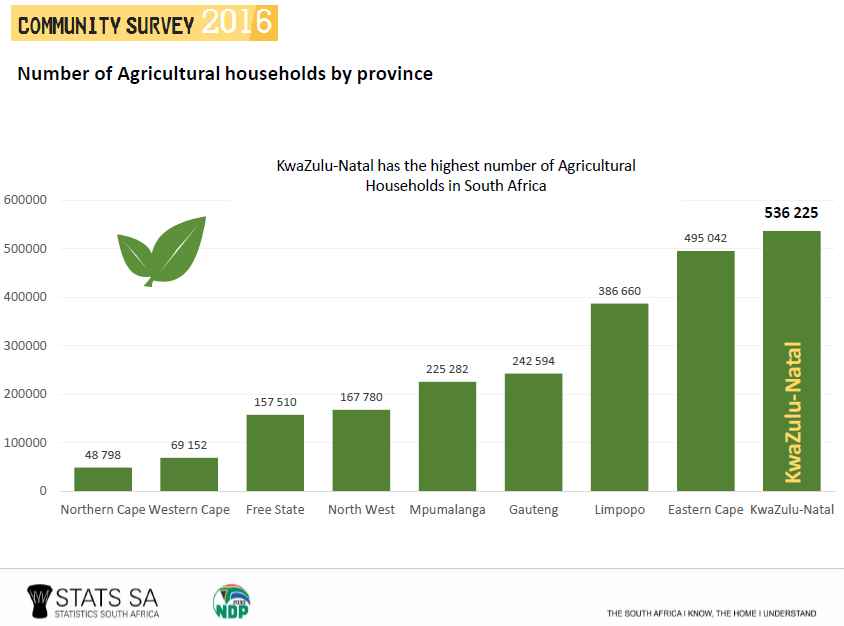
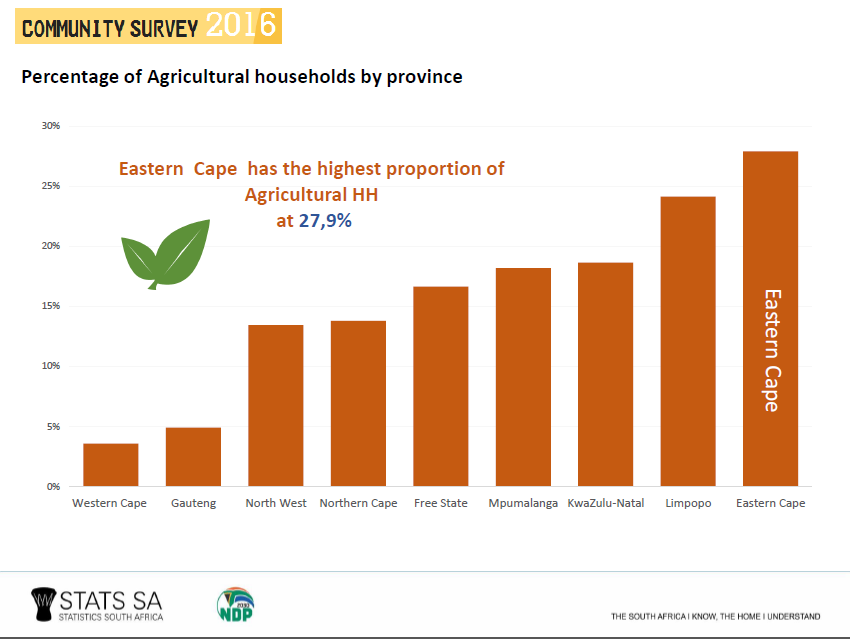
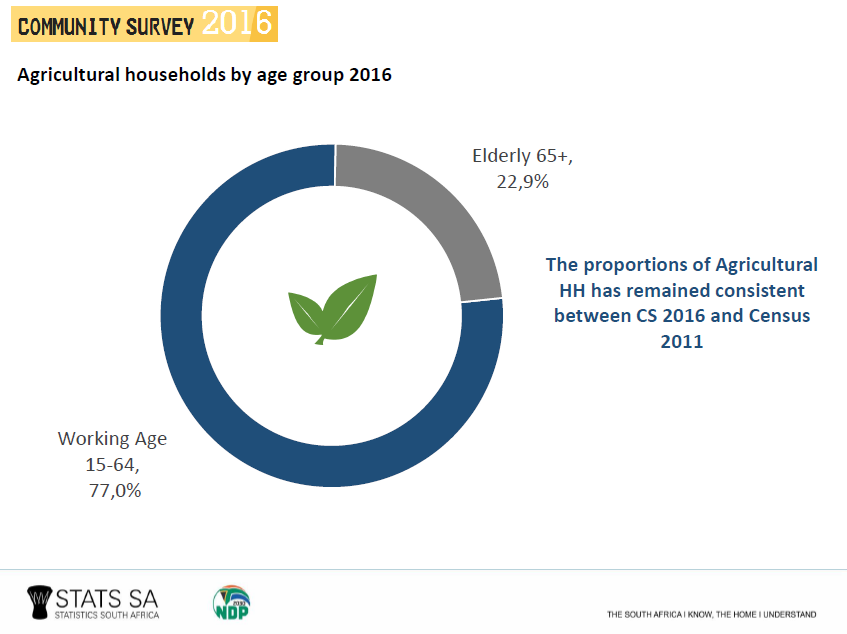
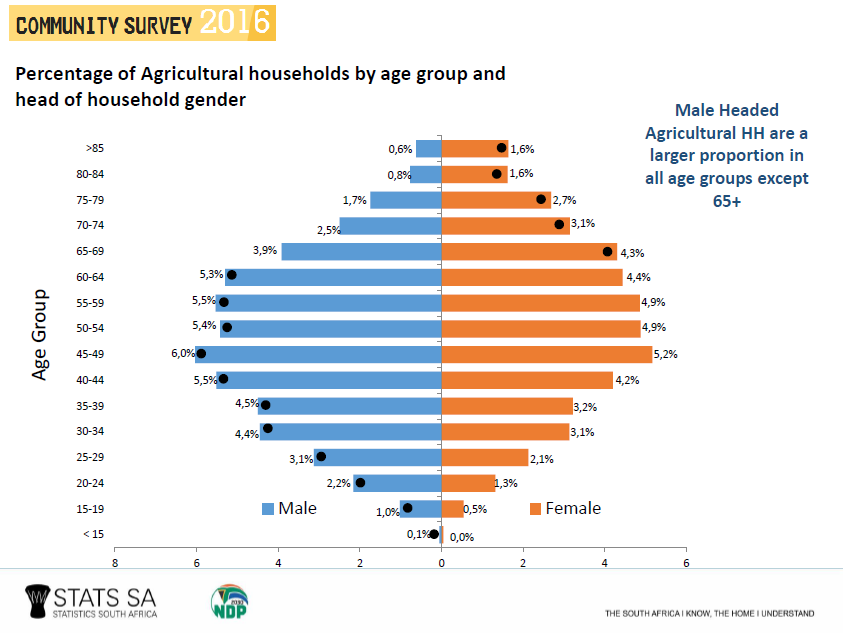
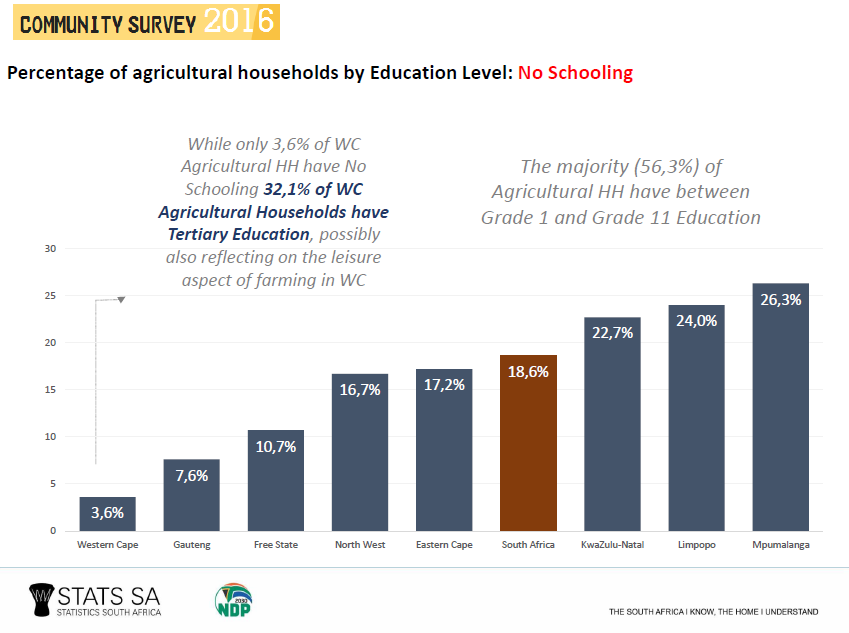
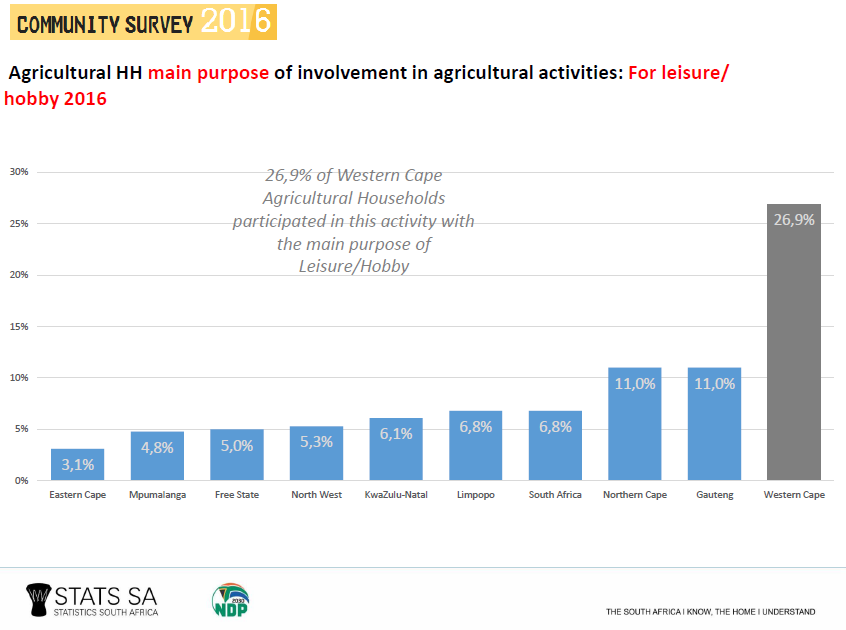
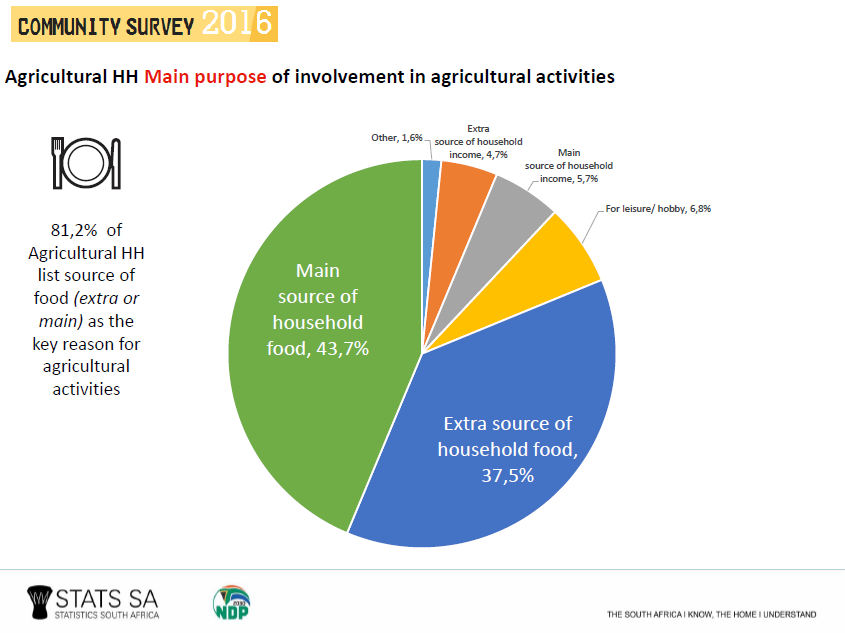
Land audit
Government conducted a land audit in 2017
- Since the dawn of democracy in South Africa no official information has been published on land ownership according race, gender and nationality. There was need to show who owns South African land and to track progress of land reform to fulfil section 25(5) of the Constitution objectives to enable South African citizens access to land on equitable racial and gender basis.
- The Department of Rural Development and Land Reform published in 2013 the first Land Audit on State-Owned Land. That Land Audit revealed, among its findings, that most of this state land was un-surveyed and unregistered trust land which is occupied by individuals and communities in the former homelands. Cabinet instructed the department to conduct a second Land Audit with particular focus on private ownership and use of land by race, nationality and gender.
- The land audit only provides information on the private individual ownership of farms, agricultural holdings, erven and sectional title units by race, gender and nationality.
- The land audit provides such private landownership only on the basis of land parcels registered at the Deeds Office as of 2015.
- The Land Audit (2017) reveals the relationship of South Africans to one another through the management of land as a resource for sustainable development and nation-building.
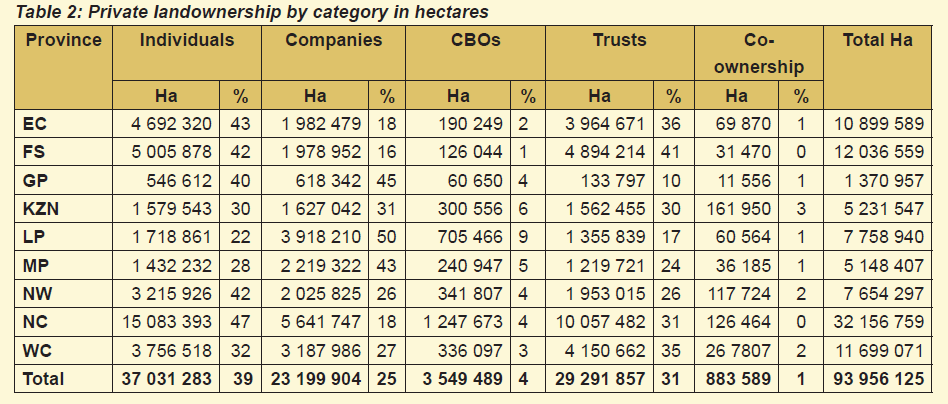
- 114 223 276 ha or 94% of 121 924 881 ha land in the country is registered in the Deeds Office. 7 701 605 ha or 6% is unregistered trust state land in the Eastern Cape and Limpopo at 5 545 156 ha.
- The Land Audit also shows that individuals, companies, and trusts own 89 523 044 ha or 90% of the 114 223 276 ha land.
- Individuals own 37 800 986 ha or 39% of this total land.
- Trusts own 29 291 857 ha of land.
- Companies own 23 199 904 ha of land or 25%.
- Community Based Organisations own 3 549 489 ha or 4% of land.
- Farms and agricultural holdings - with 469 258 or 6% of total land parcels and 111 025 515 ha or 97% of the total land - are owned by 588 045 or 7% of total landowners.
- 56 million of the total population found in these tiny land parcels command higher locational rent and prices than any in the R8 trillion national property market.
- The Land Audit reveals that White people own 26 663 144 ha or 72% of the total 37 031 283 ha farms and agricultural holdings by individual landowners.
- Coloured people own 5 371 383 ha or 15% of land
- Indians own 2 031 790 ha or 5% of Land
- Africans own 1 314 873 ha or 4% of land.
- The Land Audit also revealed that:
- Individual males own 26 202 689 ha or 72% of the total farms and agricultural holdings owned by individual owners; followed by females at 4 871 013 or 13%.
- Male-female own 3 970 315 ha or 11%, co-owners 655 242 ha or 2%, and other 1 379 029 ha or 3%.
Recapitalisation and development programme
- In 2008, the Department of Rural Development and Land Reform put distressed farms, which received subsidy from the land redistributed projects, under the Recapitalization and Development Programme (RADP) to revive them.
- The aims of the programme were to enhance food security; increase the output of farms towards commercial production; improve income for farmers and employees; increase the capacity of emerging farmers; increase productivity or efficiency levels on land reform farms; and contribute towards rural transformation.
- The programme involved mentoring support for the emerging farmers and guaranteed uptake of products produces by the farms.
Women and land
- The Extension of Security of Tenure Act gave women, for the first time, the same rights in land as men, by including women in its definition of “occupier”.
- The White Paper on Land Reform emphasises government’s intention to target women in its land reform policy.
- The democratically elected government of 1994, reviewed and amended past discriminatory policies and legislation – which addressed gender discrimination.
- Government established a Commission on Gender Equality and a Ministry responsible for Women to ensure the full and equal role of women in every aspect of society.
Examples of successful land reform projects
Case study 1: Double Drift Community, Eastern Cape Province
In 2017, the Double Drift Community claim was settled with the community of 1500 members, receiving 1300 hectares of land in the Eastern Cape which constitutes 21 farms and is now the Double Drift Nature Reserve. They are running a game farming venture.
Case study 2: Ravele Community, Limpopo Province
The transfer of this land was done in 2005.The Communal Property Association has since made great strides in making the land productive and thus contributing to food security in our country. The CPA continues to record profits and has been exporting their produce, macadamia and avocados amongst others, to Europe, China and other markets.
Case study 3: The High Haven Farm Project
The Nduzulwana family (then couple, children) are beneficiaries of a government land reform programme, the High Heaven, a 57ha farm outside East London. The project started with pigs, cows and chickens as a focus of operation. Extension officers offer continuous assistance and support. The High Heaven farm was leased from the state, with an option to buy, as stipulated in the Department of Rural Development and Land Reform’s Proactive Land Acquisition Strategy (PLAS) programme. It thus became a commercial farm. The farm employs 24 permanent employees, and 26 seasonal employees. The farm supplies poultry products for distribution in supermarket and restaurant stores across the province. The dairy and pork production is also supplied for local markets.
Case study 4: Fortune 40 Youth Farmer Incubation Programme
The Mpumalanga Fortune 40 Youth Farmer Incubation Programme aims to foster and accelerate the growth of agriculture and agro-processing sectors and catalyse the participation of youth in the farming sector. A fair and transparent recruitment and selection process was followed in choosing the beneficiaries which are mainly youth and women. The beneficiary youth were placed in a farm within 50 kilometre radius from their homes. 11 incubators were appointed based on their experience and capacity. All farms falls within the radius of an Agri-Park which supply Agri-hubs. In this way the young farmers have an opportunity to participate in the Mpumalanga International Fresh Produce Market. The Fortune 40 farms in total constitute 1600 ha with potential of expanding as and when additional farms are secured.
Case study 5: T-tlou farming
T-tlou farming is located in Pilgrimshoop farming area approximately 10 km North of Polokwane town along Dendron road. The size of the farm is 370 hectares. The farmer has entered into 20 years lease agreement with Polokwane local municipality from 2008 until 2028 with subject to renewal. The current farm (Pilgrimshoop) has been used for vegetable and livestock production ever since it was established. The farm is suitable for crop and livestock production. The Department of Agriculture and Rural Development in the province has assisted the farmer with the infrastructure such as: 10 ha drip irrigation, borehole drilling and equipping, and a 20ha Centre-pivot irrigation system. The farm has well defined markets for the produce, these include: KLM, APOL, Tiger brands, Mozambique, Peppadew international, NTK ,Goseame & local Hawkers.
Case study 6: Warrenton Super Chicken, Northern Cape
The broiler farm was purchased through LRAD funds from a commercial farmer. The previous employees (60) approached the Magareng Municipality to assist in procuring the farm on their behalf. The farm was purchased though the Land Reform transaction programme. Warrenton Super Chicken is 21ha in extent, with 9 chicken houses at the carrying capacity of 910 000 chickens per house. The company has 1 big storage shed and extra 3 small ones, kiosk, an abattoir with the through-put or capacity of 2 000 chickens that can be slaughtered per day. The company rears chicken from a day old up to day 35 on average where they are slaughtered, packaged and sold in different weights. The chicken produced by the company is brine free, ensuring good quality and taste. The farm produces innovative and added value to the chicken products by making chicken sausages and patties. They also sell chicken barbeque to the community and people who are driving on N12 on daily basis.
Case study 7: Batho Farming Youth Empowerment Project
The 5ha portion is leased from Matjhabeng Municipality in Virginia Farm Commonage. The beneficiaries transport its own produce to markets. The project is planning to employs up to 20 seasonal workers. The beneficiaries have full time support from economics and extension services access in preparation for production. Mentorship and intensive training have been provided.
Case study 8: Plot 7H14
The 24 ha PLAS farm was to Ms Mapule Fourie in December 2012. Initially Ms Fourie was leasing 4,6ha plot from the Tadcaster Primary school where she was producing cash crops like lucerne wheat, groundnuts, maize and vegetables. Vegetables were sold at a road stall next to N18 at a reasonable price. Income generated was utilized to pay school fees for her daughter at tertiary and the savings were used to plough back into the farming business. In 2009, she entered the Female Farmer Entrepreneur Awards and came first price under the category: Top Producer: Small holder: Horticulture & Crops.
Case study 9: Killarney Youth Cooperative
The 54ha farm was purchased in 2008 through LRAD transaction for extension of commonages under the administration of the Dikgatlong Municipality at Riverton. It was procured for 74 households, but only 15 youth individuals are currently active in the project. In 2009 Killarney Youth Cooperative was registered. Farmers are assisting other youth farmers in the area with sharing of implements and advice on production and upgrading of infrastructure and again during harvesting process. 15 youth members are employed seasonally during harvesting and in the vegetable project.
Case study 10: Iphemeleng CPA
The 20,9ha irrigation farm was purchased through LRAD funds in January 2006 for 36 small holder farmers; (20 Females & 16 Males). The farm has 20.ha of water rights and is 5km from Hartswater in Polokwane Local Municipality. It forms part of the Vaalhaarts Irrigation Scheme which consists of 35 000ha of the irrigation land and a comprehensive canal system is supplying water to the irrigation plots. The farm was identified for Recap in 2012/13 financial year. Beefmaster was appointed as the Strategic Partner (co-management) for the project. Implementation commenced in October 2012 The farm was listed for CPA regularization as not all the members were actively involved in the running of the project. The business is operating as Iphemeleng Small farmers (PTY) LTD on behalf of the CPA.
Case study 11: Project Lungisa Indlela Village, KwaZulu-Natal
Lungisisa Indlela Village (LIV) which is a non-profit organisation committed to uplifting the lives of orphans and vulnerable children in partnership with government and businesses. This organisation caters for the social and educational needs of approximately 120 children. To date, LIV has undertaken joint ventures and received financial support from various government departments including DARD and has successfully completed a number of projects which include the following: Construction of housing facilities, food security and commercial agriculture projects, sporting facilities, construction of school, etc. The Department also funded and facilitated the establishment of a hydroponic growing facility which cost R1.2million and was completed in In September 2015. As a joint venture, LIV has contributed approximately R1.3million towards the completion of the hydroponic project which includes the construction of a pack-house. The Departments total financial investment is R1 580 000 thus far which accounts for all agricultural interventions at LIV. The hydroponic project is designed for the commercial production of cucumbers in 10 tunnels and LIV has secured markets at Checkers and Pick and Pay. The first crop was established in September 2015 and the project is currently fully operational. The farm produces 180 000 cucumbers per annum.
Resources
Reports
Final Report of the Presidential Advisory Panel on Land Reform and Agriculture, released on 28 July 2019
Websites
- Brand South Africa www.brandsouthafrica.com
- Presidency www.thepresidency.gov.za
- Department of Rural Development and Land Reform www.drdlr.gov.za
References
High Level Panel on the Assessment of Key Legislation and the Acceleration of Fundamental Change
Booklet
Presidential Land Handover, 2019 [PDF]
Videos
Deputy President Mabuza hands over land in Kuruman, 16 April 2019
Deputy President David Mabuza hands over land claims in Empangeni, 19 March 2019
Land reform successes - Mkhwanazi KwaZulu-Natal, 12 March 2019
President Ramaphosa Mamelodi land handover, 9 March 2019
King Mkhwanazi comments on receiving land back, 18 Oct 2018
Minister Nomvula Mokonyane briefs media on Post Cabinet meeting on Land Reform debate, 7 Sep 2018
President Cyril Ramaphosa's comments on land, 28 Aug 2018
We’re on board with legal land reform, says British leader Theresa May, 28 Aug 2018 [Multimedia LIVE]
President Cyril Ramaphosa speaking on Land Reform matters, 27 Aug 2018
Brazilian lessons on land, 26 Aug 2018
Deputy President addresses Landbou Weekblad & Agri-SA Summit, 23 Aug 2018
President Cyril Ramaphosa on Land Reform Programme during BRICS Stakeholders Round-table meeting, 6 Jul 2018
Relevant media releases and speeches
The Presidency releases Expert Advisory Panel on Land Reform report
The Presidency releases Expert Advisory Panel on Land Reform report, 20 April 2019
An update on the status of the Panel Report and a response to the recent media reports regarding a “leaked copy” as well as the “AgriSA Minority Report”.
Kuruman land handover ceremony
Deputy President David Mabuza: Hand over of restituted land to Kuruman, 16 April 2019
Settled here, making do with their least fortunes, Africans mainly were removed to Bophuthatswana, often to create space for military camps and other purposes.
The Seoding, Ga-Mopedi and other communities that were affected by these removals have nursed these wounds, the dispossession of being, alienation of the right to belong, the freedom to be and the denial of the fundamental human right to think, eat, work, cloth and feed their children. They were moved and shunted around on whim and over sheer accidents of their birth, and by the slime, the roll or click of their tongue.
In a land of absurdity and peril, the Seoding and Ga-Mopedi Communities were moved to the hinterlands of the back and beyond, far-away from their original lands based on nothing else, but their mother tongue of Setswana. They bore the worst brunt of apartheid machination, herded and dehumanised as social experiments in Bantustans. They were treated as pawns in the service of new settlers, destined to a life of slavery as migrant labourers and in the process making them pariahs in the land of their birth.
On this day, we have come here to make right what was wrong. We are here to numb their pain and to give back what is rightly theirs, so that they can move forward and build a different future for themselves and their future generations, in a truly free and democratic South Africa.
Ebenhaeser land claim settlement ceremony
President Cyril Ramaphosa: Ebenhaeser land claim settlement ceremony, 23 March 2019
The handing over of these title deeds is a historic occasion, because it includes the first ever settled land claim in the Western Cape to descendants of the Griqua people.
It is in the ownership of land that we find our independence as a people.
It is land that we rely on to live, to work and to eat.
It is land that holds firmly the roots of our ancestors.
Rustenburg land handover ceremony
We therefore welcome the initiative taken by Anglo American today to support Government’s socioeconomic transformation agenda. This includes the ongoing identification of land, which is not needed for mining or associated infrastructure, to donate to municipalities to assist them with delivering on their service delivery mandates.
In July 2016, the Rustenburg Local Municipality approached Anglo American Platinum to donate property to the municipality for various purposes including housing and human resettlement projects; and projects to improve the livelihoods of local communities. Special focus was on the numerous informal settlements in the greater Boitekong area.
Anglo American Platinum resolved to make certain land parcels available to the municipality. Both parties ran feasibility studies on the properties earmarked for donation and found them to be suitable for habitation.
Today we are presiding over some of these monumental handovers. More than 242 hectares, valued at about R17 million will be transferred to the municipality. Furthermore, more than 27 hectares, valued at just over R9 million, will be transferred to the Rustenburg Alchemy Development Trust.
Parliament concludes briefing by experts on Land Reform and the Constitution
Ad Hoc Committee concludes briefing by experts on Land Reform and the Constitution, 11 March 2019
The Ad Hoc Committee to Amend Section 25 of the Constitution continued with hearings with experts on the question of land reform, which will assist with drafting the necessary constitutional amendment to make it possible for the state to expropriate land without compensation, in the public interest.
The committee will now apply its mind before considering a draft interim report later this week.
Mamelodi land handover ceremony
President Cyril Ramaphosa: Land Handover Ceremony, 9 March 2019
We are today celebrating the settlement of ten land claims in Gauteng that were lodged before 31 December 1998.
Many of our people have waited for far too long for this process of land restitution and compensation to be completed.
We appreciate the patience and the perseverance of claimants, but recognise that much more needs to be done and with greater urgency.
Today is part of a process that will cover the length and breadth of this country.
We are settling land claims, returning the land to those communities and families from whom it was taken, and thereby providing the restitution that our Constitution requires.
Opening of National House of Traditional Leaders
President Cyril Ramaphosa: Opening of National House of Traditional Leaders, 19 February 2019
Funds were therefore reprioritised towards a package of support measures for black commercial farmers to increase their entry into food value chains through access to infrastructure like abattoirs and feedlots.
A significant portion of the funding will go towards export-oriented crops that are highly labour intensive.
Government has finalised 30 year leases with nearly 900 farmers to enable them to mobilise funding for agricultural development.
These measures are part of the broader effort to unleash an agricultural revolution in South Africa. The epicentre of this revolution will be in the rural areas of our country.
South-Africa-European Union media briefing
President Cyril Ramaphosa: South Africa-European Union media briefing, 15 November 2018
During the Summit we exchanged views on land reform in South Africa.
We underscored that our focus is on maintaining investor confidence, promoting agricultural production, improving food security and reducing poverty.
We affirmed our commitment as South Africa to the values of our Constitution, the rule of law and the principle of equitable and just redress.
Parliament adopts report on expropriation of land without compensation.
Advisory panel on land reform
President Cyril Ramaphosa has appointed an advisory panel on land reform that will support the Inter-Ministerial Committee (IMC) on Land Reform chaired by Deputy President David Mabuza.
The panel will advise the IMC on a broad range of policy matters associated with land reform, including restitution, redistribution, tenure security and agricultural support.
State of the Nation Address 2018
President Cyril Ramaphosa: State of the Nation Address, 16 February 2018
“We are continuing the long walk he began, to build a society in which all may be free, in which all may be equal before the law and in which all may share in the wealth of our land and have a better life.
"This year, government will take decisive action to realise the enormous economic potential of agriculture. It will accelerate the land redistribution programme not only to redress a grave historical injustice, but also to bring more producers into the agricultural sector and to make more land available for cultivation.
"Government will pursue a comprehensive approach that makes effective use of all the mechanisms at its disposal. Guided by the resolutions of the 54th National Conference of the governing party, this approach will include the expropriation of land without compensation.
"Government is determined that expropriation without compensation should be implemented in a way that increases agricultural production, improves food security and ensures that the land is returned to those from whom it was taken under colonialism and apartheid.
"Government will undertake a process of consultation to determine the modalities of the implementation of this resolution.Government makes a special call to financial institutions in the country to be partners in mobilising resources to accelerate the land redistribution programme, as increased investment will be needed in this sector.
Join the conversation
Twitter @GovernmentZA
#Landreform
#LandExpropriation
Facebook: @GovernmentZA




